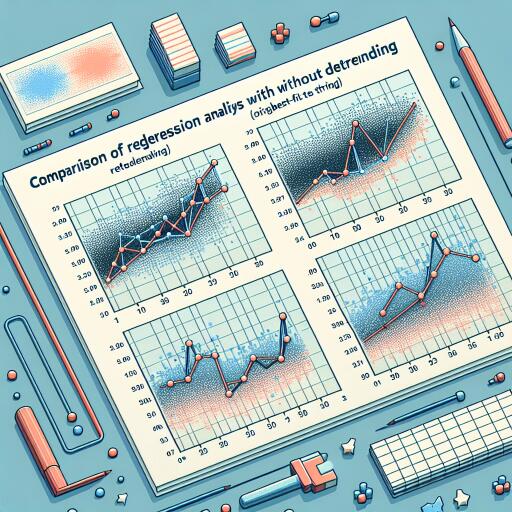
Understanding the Role of Detrending in Regression Analysis within Ecological Studies
In the realm of ecological research, especially when studying the intricate relationships between climate change variables, the methodological approach taken can significantly influence the outcomes and interpretations of a study. An essential aspect of this methodological framework that often comes under scrutiny is the process known as ‘detrending’ in regression analysis. The necessity and impact of detrending are subjects of ongoing discussions among scientists, particularly regarding their relevance and implications in climate change research. One prevalent question is whether detrending is always a requisite step in regression analysis, especially when evaluating the effects of global warming.
The concern arises from examining how global warming trends, such as increasing sea surface temperatures (SST), affect other climatic variables, including precipitation patterns. SST is frequently utilized as a surrogate measure for global warming in research studies due to its substantive representation of warming trends. However, the critical question is, if one were to perform regression analysis assessing the relationship between precipitation and SST, does detrending SST data strip the analysis of essential information regarding global warming trends?
At the core of this debate is the understanding that many climatological variables exhibit linear trends over time, caused by a range of factors including global warming. When performing regression analysis, the goal is often to understand the relationship between these variables. However, the presence of underlying trends can lead to overlapping linear relationships, which might obscure the true nature of the interactions being studied.
Detrending, or the process of removing these linear trends from the data, is commonly proposed as a solution to this problem. By detrending, researchers aim to isolate the inherent relationship between the variables of interest, free from the influence of long-term trends. The rationale is that this allows for a clearer analysis of how one variable affects another, without the confounding effect of a shared trend, like the increment in global temperatures.
However, critics of mandatory detrending argue that this process can sometimes eliminate crucial information about the very phenomena under investigation. In the case of studying global warming’s impacts, for example, detrending SST data could arguably remove the embedded signal of global warming itself. This could potentially lead to an underestimation of the actual influence global warming has on the variable of interest, such as precipitation.
This conundrum necessitates a balanced approach, where the decision to detrend should be informed by the specific objectives of the study and the nature of the data and variables involved. It is essential for researchers to critically assess whether detrending aids or hinders the interpretation of the causal relationships at play. In some cases, incorporating additional statistical techniques or models that can account for the presence of trends while still investigating the direct relationships between variables might offer a more nuanced understanding.
In conclusion, detrending in regression analysis is not a one-size-fits-all solution in ecological research, especially in the context of climate change studies. The decision to detrend should be made judiciously, considering the potential benefits and drawbacks in relation to the study’s aims. By thoughtfully determining the methodological approaches that best suit each research question, scientists can continue to uncover the complex dynamics of our changing climate, providing crucial insights into one of the most pressing issues facing our world today.





Leave a Reply